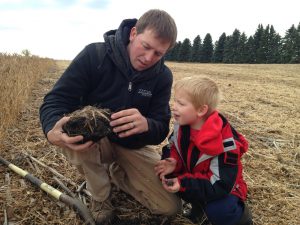 BISMARCK, ND – Wilson Family Farm, owned by Jeremy and Sarah Wilson of Jamestown, has been selected as the recipients of the 2018 North Dakota Leopold Conservation Award®.
BISMARCK, ND – Wilson Family Farm, owned by Jeremy and Sarah Wilson of Jamestown, has been selected as the recipients of the 2018 North Dakota Leopold Conservation Award®.
Sand County Foundation, the nation’s leading voice for private conservation, created the Leopold Conservation Award to inspire American landowners by recognizing exceptional farmers, ranchers and foresters. The prestigious award, named in honor of renowned conservationist Aldo Leopold, is given in 14 states.
In North Dakota the $10,000 award is presented annually by Sand County Foundation, North Dakota Grazing Lands Coalition, North Dakota Association of Soil Conservation Districts and the North Dakota Stockmen’s Association.
The Wilsons were revealed as the third recipients of the award at the North Dakota Association of Soil Conservation Districts’ convention in Bismarck on November 19. They were presented with a $10,000 award and a crystal depicting Aldo Leopold.
Described by some as “pioneers” when it comes to demonstrating the importance of soil health, Jeremy and Sarah Wilson are showing that agricultural conservation can profit while improving the productivity of their land.
By mimicking nature with a diverse, regenerative, no-till cropping system, the Wilsons are building soil structure and their farm’s resilience to survive changes in weather and commodity markets.
Better soil health means fewer costly inputs are needed to grow crops. For the Wilsons, it also means their customers have a product grown with fewer chemicals, fertilizers and fuel. All of this is gained while maintaining yields and protecting soils that were previously susceptible to wind and water erosion.
Cover crops are tailored for a specific purpose and site. Winter rye is grown to address the soil’s salt content, a serious resource concern in North Dakota’s glaciated region. Rye also helps cycle and scavenge nutrients, keeping them from leaching away and becoming a pollutant. Other cover crops help break up compacted soil. This allows excessive rain to infiltrate the soil rather than running off. The stored moisture reduces stress on crops during times of drought.
Efforts to seed cover crops by aircraft and modified planters have been noticed and replicated by neighbors. The Wilsons’ willingness to collaborate and share what conservation can do for the land has had a positive ripple effect across multiple states. Their long history of working with the Stutsman County Soil Conservation District, includes holding public tours on conservation practices and cropping systems.
Their public outreach has extended to constructing a Heritage Room in their home. Complete with professional grade audio/video equipment, the space allows them to show visitors what happens on their farm throughout the year, and not just on the day of their visit. Business and political leaders, scientists and journalists from around the globe have visited their farm to learn the value of what they are doing.
For more than 20 years, the Wilsons have been outstanding spokespersons and advocates for conservation agriculture. Jeremy was selected as a “Soil Health Champion” by the National Soil Conservation Association of Conservation Districts.
The Wilsons donate three acres of sweet corn annually to the Great Plains Food Bank. That equals more than 27,600 meals of fresh produce to those in need. It’s another example of how through conservation practices and stewardship, the Wilsons have provided benefits that go far beyond their farm gate.
Sarah Wilson says every farm is as unique as a thumb print. As the fourth generation of Wilsons to farm this piece of North Dakota, they are certainly making their mark.
“The Wilson family epitomizes the word ‘stewardship’ and is a deserving recipient of this year’s Leopold Conservation Award,” said Dan Rorvig, North Dakota Stockmen’s Association President. “Not only have the Wilsons adopted innovative practices to enhance the resource base on their fourth-generation operation, but they’ve opened their door to people from around the globe to teach them about agriculture and the good that is happening on the land.”
NDGLC President, Chad Njos, says, “The North Dakota Grazing Lands Coalition is honored to present this prestigious award to the Wilson family,” said “The way they live and manage their operation is an outstanding model in the implementation of voluntary conservation, inspiration of other landowners by example and outreach on the role public landowners play in conservation.”
The 2017 award recipient was Miller Ranch of Fort Rice.
The Leopold Conservation Award in North Dakota is made possible thanks to the generous contributions from USDA Natural Resources Conservation Service, Starion Financial, North Dakota Game & Fish Department, APEX Clean Energy, Audubon, Basin Electric Power Cooperative, Cow Chip Ranch, Dakota Community Bank and Trust, Delta Waterfowl, Ducks Unlimited, KEM Electric Cooperative, The Nature Conservancy, North Dakota Department of Health, North Dakota Natural Resources Trust, Roughrider Electric Cooperative, Slope Electric Cooperative, The Wildlife Society North Dakota, and World Wildlife Fund.
For more information on the award, visit www.leopoldconservationaward.org.
















Comments are closed
Sorry, but you cannot leave a comment for this post.